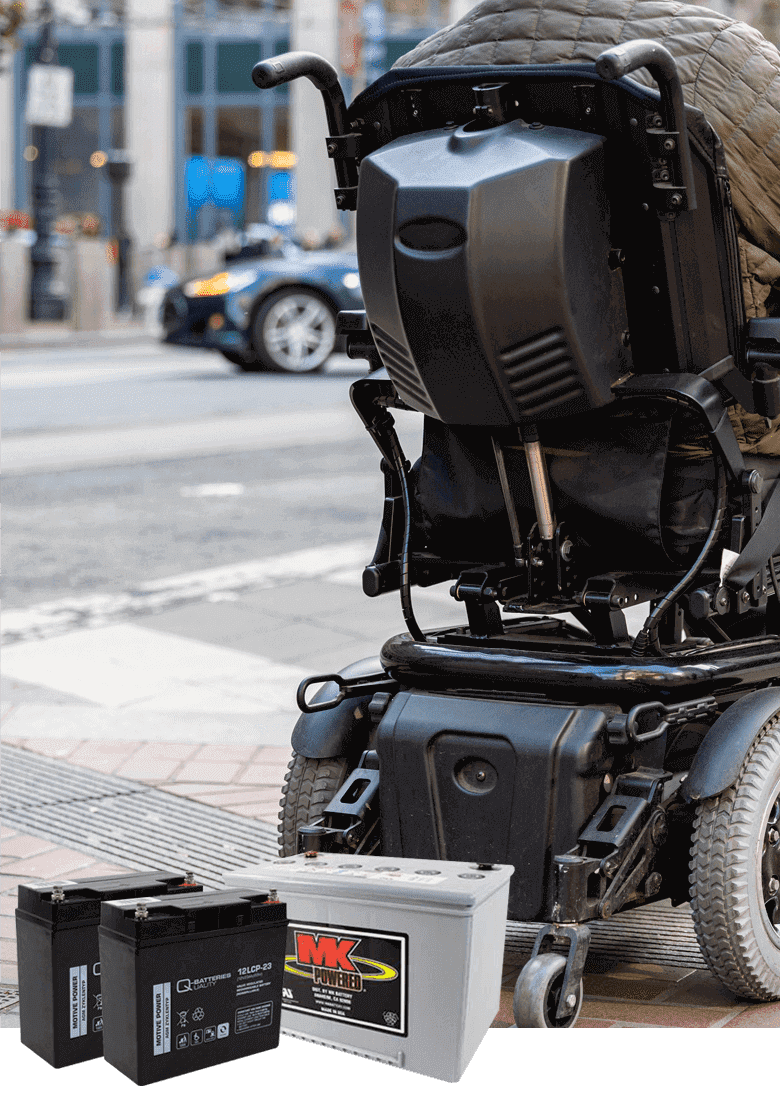Batteries & accus for rehab applications
Wheelchairs, stair lifts & Co increase mobility and offer great help in everyday life. Therefore, well-chosen batteries must be used for these technical devices.
Profit from our large variety of cyclic rechargeable batteries and let our rehab specialists advise you appropriately for your application.
Get price benefits now as a B2B customer!
Register today and take advantage of our wide selection of products including competitive prices!

FREQUENTLY ASKED QUESTIONS
You have questions about the rehab industry?
Here you will find a summary of the general questions and answers for the area of rehab technology.
If we have not answered your questions, please contact us by e-mail or telephone.
We will be happy to help you. info@akkusys.de+494101 37676-0
1
What is meant by a cycle type compared to a standard type?
Cycle types are of great importance for many rehab applications. These batteries are designed for continuous charging and discharging. This is the case, for example, with a scooter or electric wheelchair. The battery is discharged during the day and is usually only reconnected to the charger at night.
The term cycle resistance indicates how resistant a battery is to this cyclic load.
A cycle type thus survives considerably more charging and discharging processes than a standard type.
The main constructive difference between a cycle type and a standard type is the lead plate thickness built into the battery. Thicker lead plates are installed in the cycle type. For this reason, cycle types are usually heavier and therefore more expensive than standard types.
2
Which batteries can I install for which wheelchair?
The battery manufacturers do not make it easy for our customers.
Our rehab specialists already know which battery fits many wheelchair models and can give you competent advice.
Together we will then find the right product for you. Capacity (Ah), dimensions and area of application are the decisive parameters for selecting the suitable battery.
3
Which connections are necessary to connect a battery?
The following image shows the most common connection types of lead batteries. A frequent connection problem arises when installing AGM batteries in older e-wheelchairs because autopoles were originally available and the new batteries do not have them as standard. In this case, we are happy to supply Autopol adapters that are screwed into the screw connection of the batteries.
(see image)
4
Which charging technology should I use?
Watch out for the different batteries! There are different charging techniques for acid, gel, AGM and lithium batteries. The wrong charger can damage the battery in the best case and lead to an explosion in the worst case. Be sure to seek advice! Please do not experiment!
5
Do I lose my warranty claims if I do not buy the batteries from the wheelchair manufacturer?
No, this is not the case.
6
Do replacement batteries have the same service life / quality?
Yes, the replacement battery can also be better. What is important is the freshness of the battery, the correct internal construction and the weight. The following applies: The heavier the battery, the longer the expected service life.
7
How long has AKKU SYS had experience in supporting rehab companies?
We have been providing services to rehabilitation homes since 2009.
8
Can I rely on the ability of AKKU SYS to deliver?
Yes, thanks to our own warehouse with a size of 4,500m², it is possible for us to deliver with great reliability in a short time.
9
Can AKKU SYS supply the common known rehab battery brands?
Yes, our common well-known rehab battery brands include Exide Sonnenschein, Q-Batteries, MK Battery and Multipower.
10
Who can advise me personally if I am unsure about the choice of batteries and the appropriate charging technology?
Our specialists in rehab technology:
Martin Deitert
m.deitert@akkusys.de
+49 4101 37676-27
Lui Volik
l.volik@akkusys.de
+49 4101 37676-29
m.deitert@akkusys.de
+49 4101 37676-27
Lui Volik
l.volik@akkusys.de
+49 4101 37676-29
11
How do I charge rehab batteries (DC-AGM, gel) correctly in the interest of the longest service life?
Avoid part charging at all costs, e.g. only charge in the afternoon. Charge for about 12-14 hours after each use.
If possible, charge your battery at least 24 hours before the first use. Take every opportunity to charge your battery. The deeper you discharge a battery, the shorter its expected life will be. A deep discharge is particularly damaging to your battery.
12
Do I have to charge my battery after each use?
Yes, we recommend charging the battery after each use. This is especially important during storage over the winter months.
13
Does AKKU SYS possibly also sell to private customers?
No, we only sell to commercial customers.
14
Can AKKU SYS also tell me the recommended retail prices?
No, because AKKU SYS leaves the pricing decision to the commercial customer.
15
Why are DC-AGM and gel batteries generally more useful than lithium batteries in wheelchairs / scooters?
Heavy lead batteries are usually necessary as counterweights in the wheelchair for maintaining tipping stability.
The BMS (Battery Management System) of the lithium batteries could abruptly block further travel at high depth of discharge, e.g. at danger points such as traffic lights.
16
Why does AKKU SYS not usually offer lithium replacement batteries?
As a rule, lithium battery packs should only be purchased from manufacturers. We advise you on liability issues.
17
Can I take lithium batteries installed in a scooter / wheelchair with me on air travel?
No, the lithium batteries may only be carried disassembled. Please observe the transport guidelines and contact your airline regarding the regulations.
18
Do I save time if my personal AKKU SYS rehab specialist precisely selects the right batteries for my scooter / wheelchair?
Yes you do, because our rehab specialists can quickly select the right battery for you even if the data is not complete. For many wheelchair models, our specialists already know which battery fits and can advise you competently.








